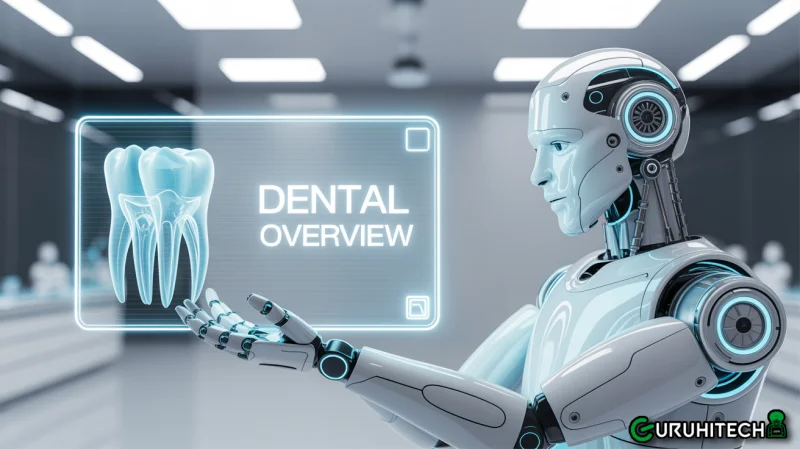Navigating the Ethical Landscape of AI in Dental Diagnostics

As artificial intelligence becomes increasingly embedded in healthcare, dental professionals are beginning to explore not just the benefits, but also the ethical implications of this powerful technology. Platforms like Diagnocat are leading the way in AI-driven dental diagnostics, offering remarkable advances in speed, accuracy, and efficiency—but also prompting important discussions about data privacy, clinician responsibility, and patient trust.
AI has revolutionized dental diagnostics by automating the analysis of radiographs and CBCT scans, identifying pathologies with speed and precision that complement human expertise. While the clinical advantages are clear—improved accuracy, faster workflows, better treatment outcomes—these gains come with ethical considerations that practitioners must take seriously.
Dentists remain ultimately responsible for patient care, even when supported by AI. Relying too heavily on automated insights without critical oversight may undermine professional judgment. Ethical use of AI means understanding its limitations, validating its findings, and using it as a tool—not a replacement—for clinical decision-making.
Ensuring Transparency and Patient Consent
Transparency is essential in any healthcare setting, especially when introducing new technology into the patient experience. Patients have the right to know when AI is being used in their diagnosis and how it influences the decisions surrounding their treatment. Dental professionals should clearly explain that AI tools, like those offered by Diagnocat, are designed to support and enhance the dentist’s expertise—not to override it.
Informed consent must evolve to include discussions about AI-assisted diagnostics. Patients should be made aware of how their data is used, stored, and protected. This conversation not only safeguards legal and ethical standards but also strengthens patient trust and engagement.
Ti potrebbe interessare:
Data Privacy and Security
With the use of AI comes the collection and analysis of large amounts of sensitive health data. This raises valid concerns about privacy, especially as digital systems become interconnected across platforms. Dental practices must ensure that any AI tools they adopt are compliant with local and international data protection regulations, such as HIPAA or GDPR.
Reputable platforms like Diagnocat are built with robust security protocols and encryption to ensure patient data is handled with the highest level of confidentiality. Still, it’s crucial for dental professionals to remain vigilant, regularly reviewing their data management practices and vendor security policies.
Addressing Algorithmic Bias and Fairness
AI systems are only as good as the data they’re trained on. If training datasets lack diversity—across age, ethnicity, or pathology types—the AI may perform unevenly across different patient populations. This creates potential risks of misdiagnosis or unequal care.
To navigate this ethically, developers and practitioners must prioritize diversity in training data and continuously evaluate the AI’s performance. Clinical feedback loops are essential to ensure algorithms remain accurate, fair, and representative of the patient population they serve.
Striking a Balance Between Innovation and Integrity
The dental profession has always upheld high ethical standards. As AI becomes more integrated into care, it’s vital that those standards evolve to reflect new challenges. Dentists must balance innovation with responsibility, leveraging AI to improve care while remaining deeply committed to their clinical duties, patient rights, and the principles of ethical practice.
Ongoing education, peer collaboration, and thoughtful technology adoption are key to navigating this new landscape. By staying informed and proactive, dental professionals can embrace AI with confidence—knowing they are using it ethically, effectively, and in the best interest of their patients.
Ti potrebbe interessare:
Segui guruhitech su:
- Google News: bit.ly/gurugooglenews
- Telegram: t.me/guruhitech
- X (Twitter): x.com/guruhitech1
- Bluesky: bsky.app/profile/guruhitech.bsky.social
- GETTR: gettr.com/user/guruhitech
- Rumble: rumble.com/user/guruhitech
- VKontakte: vk.com/guruhitech
- MeWe: mewe.com/i/guruhitech
- Skype: live:.cid.d4cf3836b772da8a
- WhatsApp: bit.ly/whatsappguruhitech
Esprimi il tuo parere!
Che ne pensi di questa notizia? Lascia un commento nell’apposita sezione che trovi più in basso e se ti va, iscriviti alla newsletter.
Per qualsiasi domanda, informazione o assistenza nel mondo della tecnologia, puoi inviare una email all’indirizzo [email protected].
Scopri di più da GuruHiTech
Abbonati per ricevere gli ultimi articoli inviati alla tua e-mail.
